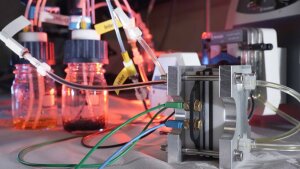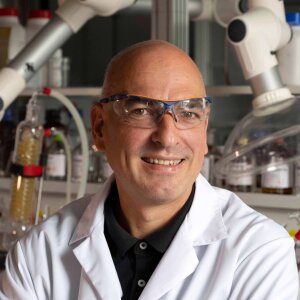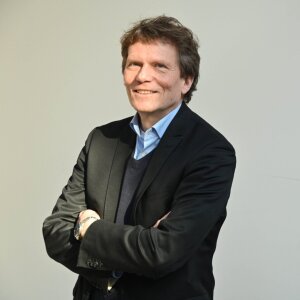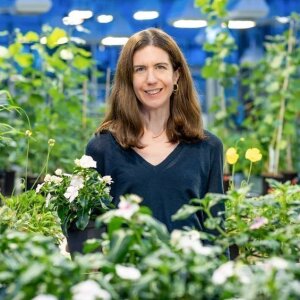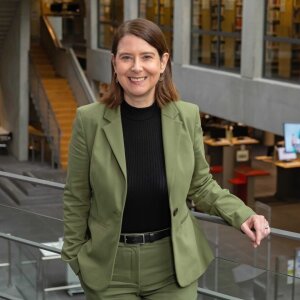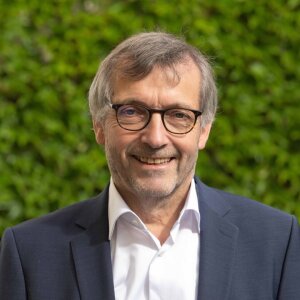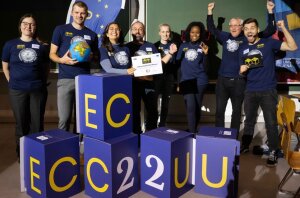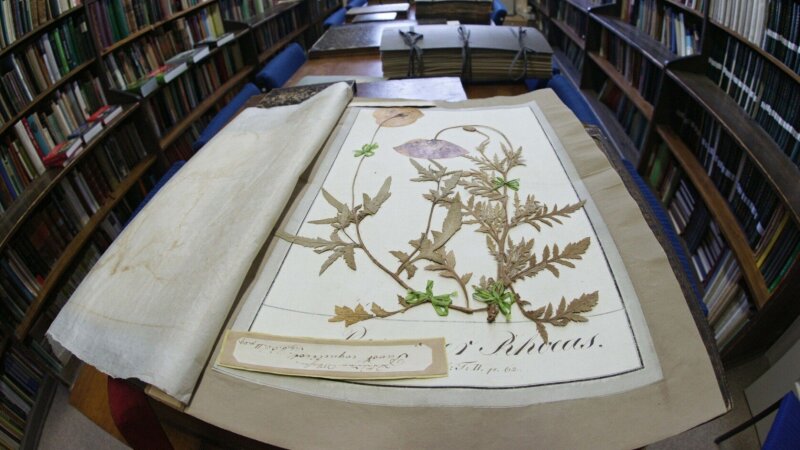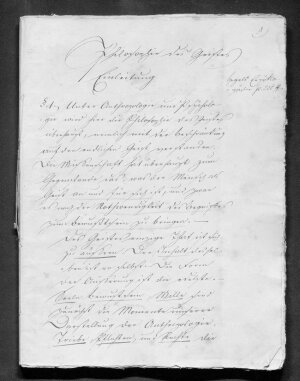News
ERC Advanced Grant
Project for the development of sustainable energy storage solutions has been granted funding.
A redox flow battery prototype developed by Prof. Schubert and his team.
Image: Jan-Peter Kasper (University of Jena)The energy transition can only be successful if the electricity produced in an ecological way is available at all times - day and night. For this purpose, appropriate solutions must be developed that can store the energy generated in different quantities and release it again when required. This »battery of the future« is exactly what Prof. Ulrich S. Schubert and his team are working on. His new research project, »FutureBAT«, was recently awarded an Advanced Grant by the European Research Council (ERC). The chemist and materials scientist will receive around 2.5 million euros in funding over the next five years, which will be invested in eight new research positions and two jobs for technical staff.
Motivation for future-oriented research
»The ERC Advanced Grant is yet another sign that our research is on the right track - we want to create sustainable energy storage solutions that will save resources in the world of tomorrow,« says Prof. Schubert.
Prof. Schubert's research is based on redox flow batteries. »These are the only type of batteries where performance and capacity can intrinsically be varied independently, making them perfect for scalable stationary applications,« he explains. The innovation made by the researchers from the University of Jena revolves around the fact that the new batteries are based on watery electrolytes and work with organic macromolecules (polymers). These battery systems enable the use of inexpensive dialysis membranes together with pH-neutral saline solutions as electrolytes. The systems work - the laboratory tests have proven that. However, they still have significant limitations in terms of their capacity, service life and temperature stability.
The aim of the new »FutureBAT« project is to reduce these limitations. Specifically, the team is looking to improve the energy density, temperature range, efficiency and service life of the batteries while making them more sustainable and affordable. [AB]
Center for the Transformation of Chemistry
Prof. Ulrich S. Schubert supports new large-scale research centre.
Ulrich S. Schubert is a chemist and materials scientist at the University of Jena.
Image: Jens Meyer (University of Jena)In the autumn of 2022, the new »Center for the Transformation of Chemistry« (CTC) emerged as one of the winners of the »Science Creating Prospects for the Region!« competition run by the Federal Ministry of Education and Research (BMBF), the Free State of Saxony and the State of Saxony-Anhalt. On the back of this award, the centre began its work in Delitzsch at the start of 2023.
Prof. Ulrich S. Schubert (pictured) is a core member of the CTC team. »We see it as a task and challenge for the future to make chemistry more sustainable,« he emphasizes. At a time marked by the energy crisis and climate change, he sees an urgent need for change in terms of raw materials and production processes. Instead of gas and oil, waste products from nature should be used as basic chemicals. Carbon dioxide should no longer be emitted, but instead used as a raw material. [sh]
Leibniz Prizes for two researchers from the University of Jena
The most valuable research grant in Germany has been awarded to Prof. Hartmut Rosa and Prof. Sarah Ellen O'Connor.
The world is locked in the jaws of an economic and environmental crisis. Economic growth as we know it is no longer possible without further aggravating its catastrophic effects on the environment. Conversely, climate protection and the conservation of natural resources require a departure from established business practices and transportation methods. Prof. Hartmut Rosa is investigating what the society of the future could look like under these conditions, in harmony with people, and how best to get there. The sociologist from the University of Jena has been granted 2.5 million euros from the German Research Foundation (DFG) to fund his project over the next seven years. Prof. Rosa is one of ten researchers to receive the Gottfried Wilhelm Leibniz Prize in 2023.
»I'm delighted and honoured to receive the award,« says Hartmut Rosa. »I see it as recognition of the good work that has been done in recent years by all my staff and colleagues in the Theory department and the entire Institute of Sociology at the University of Jena, but also at the Max Weber Centre at the University of Erfurt. With the help of the funding, I want to do everything I can to ensure a brighter future for humanity«.
Hartmut Rosa is a sociologist who conducts research at the University of Jena and the University of Erfurt.
Image: Anne Günther (University of Jena)On social acceleration, resonance and property
Hartmut Rosa has been working as a Professor of General and Theoretical Sociology at the Friedrich Schiller University Jena since 2005 and has also been the Director of the Max Weber Centre at the University of Erfurt since 2013. He also acts as a spokesperson for the DFG Collaborative Research Centre TRR 294 »Structural Change of Property«, which brings together the social science research conducted at both institutions and expands it to other disciplines. Hartmut Rosa highlights some of the current research topics: »It's not just about the distribution of income and wealth, but a variety of issues such as ownership of data, gene sequences, global resources - even the wind and raw materials on the moon - and the question of who a city belongs to or whether bodily organs can be owned«.
The research and publications of the 57-year-old scientist, in particular on the social acceleration and dynamic stabilization of modern societies and on a sociology of our relationship to the world - i.e. the concept of resonance - have been translated into numerous languages. His views have garnered international attention both in scientific circles and in much wider interdisciplinary and public spheres. His concepts and theories have themselves become the subject of academic discourse.
Prof. Sarah Ellen O’Connor is a chemist and biologist.
Image: Sebastian ReuterDecoding the synthesis of complex natural products
The second Leibniz Prize 2023 winner from the University of Jena is the chemist and biologist Prof. Sarah Ellen O'Connor, who is the Director of the Max Planck Institute for Chemical Ecology in Jena and is also an Honorary Professor of Biosynthesis at the University of Jena.
Prof. O'Connor is researching biosynthesis pathways in plants. She is using gene functions and enzyme mechanisms, as well as molecular genetics and genomics, to decode the synthesis of complex natural products such as anti-cancer and neuroactive substances. Her research group recently succeeded in completely unlocking the biosynthesis pathway of strychnine, which other teams had been trying to do for years. [AB]
Research Spokesperson of the Year 2022
Katja Bär, Head of the Department of University Communication and Press Spokesperson at Friedrich Schiller University Jena.
Image: Jens Meyer (University of Jena)Katja Bär (pictured), Head of Communications and Marketing at the University of Jena, has been voted »Research Spokesperson of the Year 2022« in the category of »Research Institutes and Universities«. The award was presented by three communications associations: BdKom (German Association of Communicators), DPRG (German Public Relations Association) and GPRA (Association of Leading PR and Communications Agencies). Their aim is to recognize exemplary science communication in all scientific disciplines. [AB]
University Manager 2022
University President Walter Rosenthal honoured by weekly newspaper »Die Zeit« and Centre for Higher Education (CHE).
Prof. Dr Walter Rosenthal, President of the Friedrich Schiller University Jena.
Image: Jens Meyer (University of Jena)Prof. Walter Rosenthal has been crowned »University Manager of the Year 2022«. In the eyes of the jury, he has played a significant role in putting the Friedrich Schiller University Jena in a very strong position: »Walter Rosenthal has put the University of Jena on the map«.
Sustainability from top to bottom
The jury placed special emphasis on Rosenthal's achievements in the strategic strengthening of the university's profile lines (»Light, Life, Liberty«), the introduction of faculty advisory boards, and the university's strategic realignment.
»Rosenthal has involved all members of the university in this transformation process. He has also been highly assertive and willing to make decisions,« said the jury. The President has also pushed ahead with the structural development of the university and made sustainability a top priority. He has set up a »Green Office«, which acts as the coordination centre for the university's sustainability strategy. Above all, he is a source of ideas and has developed networks to advance projects and ensure their long-term success. [KB]
Victory in the Science Battle
The winners of the second round of the European Campus of City Universities (EC2U) Science Battle.
Image: Jens Meyer (University of Jena)In the picture on the left (from left to right), Anne Dünger (presenter), Felix Wechsler (Physics and Computer Science), Paulina Fuentes Zacarias (Medicine), Dr Jürgen Kaufman (Psychology), Dr Katrin Fröhlich (Microbiology), Rachael Akinyede (Geomicrobiology), Prof. Matthias Perkams (Philosophy) and Jack Pop (presenter) celebrate winning the second round of the European Campus of City Universities (EC2U) Science Battle on 30 September 2022. Jena's team came out on top against researchers from Coimbra (Portugal), Iaşi (Romania) and Salamanca (Spain) and will now be competing in this year's final against the team from Pavia (Italy), which won the first round in 2021. [US]
Jena welcomes new Senckenberg Institute
Herbarium Haussknecht will be part of the Collectomics module in the new Senckenberg research project.
The Joint Science Conference (GWK) has approved the »Anthropocene Biodiversity Loss« expansion project envisaged by the Senckenberg Society for Nature Research. As part of this cooperative project with the University of Jena, a new Senckenberg Institute will be established in Jena. This will involve the long-term preservation and use of the Herbarium Haussknecht – one of the most important herbaria in Europe with around 3.5 million plant specimens. Two new professorships will be established, which will further enhance the German Centre for Integrative Biodiversity Research (iDiv) and Jena's appeal as a research location. [Jördens]
A historical sheet in the Herbarium Haussknecht library.
Image: Jan-Peter Kasper (University of Jena)Philosophy of the mind
Jena philosopher Klaus Vieweg has discovered lecture notes written by one of Hegel's students.
The first page of Friedrich Wilhelm Carové’s lecture notes on the teachings of Georg Wilhelm Friedrich Hegel.
Image: Archiv und Bibliothek des Erzbistums München und FreisingA set of lecture notes found in the library of the Archdiocese of Munich and Freising opens up new approaches to the thinking of the philosopher Georg Wilhelm Friedrich Hegel (1770-1831). Hegel's biographer and researcher, Prof. Klaus Vieweg from the University of Jena, was browsing the library collections when he stumbled upon five archive boxes with notebooks and papers containing lots of intricate scribbles, which had escaped the inquisitive eyes of research for almost 200 years. The lecture notes, comprising around 4,000 pages, were written by Friedrich Wilhelm Carové (1789-1852), one of Hegel's first students at Heidelberg University. The Catholic writer, journalist and politician was one of the leading intellectuals of his time.
The manuscripts cover almost all aspects of Hegel's encyclopaedic architectonics, including a long-sought set of notes from an Aesthetics lecture in Heidelberg - there are no other records of that lecture to date. They are now being prepared for print as part of a scientific project that will take place over the next few years. [Hinterberger]
